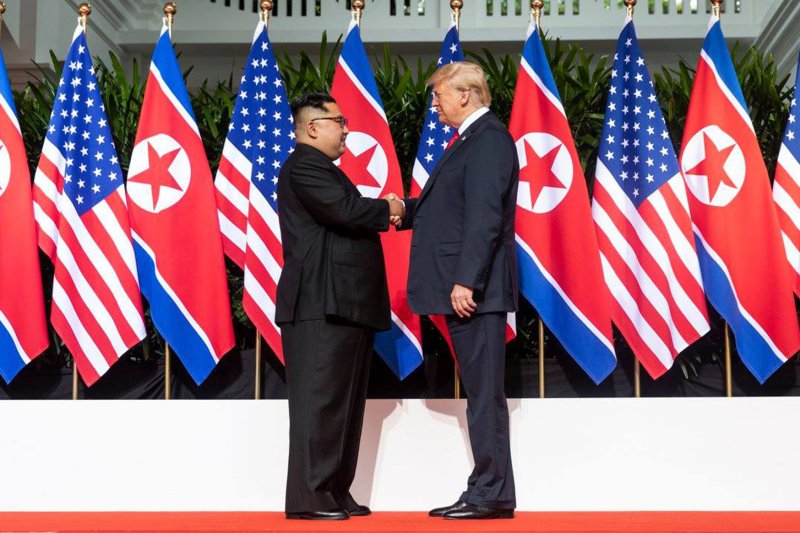President Donald Trump shakes hands with North Korean leader Kim Jong Un on June 12, 2018, at Singapore's Capella Hotel in what is the first meeting between a sitting U.S. president and a North Korean leader. Photo by Shealah Craighead/UPI |
License Photo
NEW YORK, June 20 (UPI) -- U.S. President Donald Trump's assurances North Korea is no longer a nuclear threat, following his summit with Kim Jong Un, have been met with skepticism and even ridicule -- but his assertion may be grounded in results.
Trump's confidence in his diplomacy is better understood if the focus is shifted to the political realm, where changes have significantly reconfigured U.S.-North Korea relations, Tom Collina, policy director at the Ploughshares Fund in Washington, told UPI.
"This isn't just a game of technology and counting warheads," Collina said. "It's a game of how do you change dynamics and the way countries think about each other."
After returning to Washington last week, Trump tweeted, "Everybody can now feel much safer than the day I took office. There is no longer a Nuclear Threat from North Korea."
That statement came after Trump called Kim "very talented" and praised him for his ability to govern North Korea.
"There's two scenarios here," Collina said. "One is that Trump is simply delusional and he doesn't understand that North Korea is as much of a threat technically today than they were before the summit."
"The other scenario is that he's thinking at a different level. He's talking more politically."
The analyst added, "The most positive way you can interpret what the president is saying is that he's convinced that there's a new relationship with North Korea, such that they would never choose to attack us."
But even atmospherics cannot guarantee a deterrent against North Korea's weapons, which Collina described as more advanced than assumed in 2017.
Last year, most North Korea watchers would not have guessed Kim would switch gears to all-out diplomacy.
"We didn't expect they would see so much progress in nuclear development in 2017, that as of 2018, they would be prepared to stop," the analyst said.
"But in retrospect, you can see that that was the plan all along. That the North was pushing very aggressively to make progress in 2017 with nuclear and long-range missile tests."
In the absence of greater transparency and a more specific nuclear disarmament schedule, time may be on Kim's side.
"We're playing a two- to four-year game and the North Koreans are playing a 10-, 20-year game," Collina said, referring to the U.S. election cycle and changes in administrations that can lead to drastic changes in North Korea policy.
"They don't assume the administration they're working with is going to be around much longer. They negotiated a deal with the Clinton administration, only to see the Bush administration come in and tear it up. My guess is, they're looking at Trump and they're thinking, what can we achieve with Trump before 2020."
Not only does North Korea's authoritarian regime have time to spare, any approach to "complete denuclearization" would be protracted, which makes the process challenging, says James McKeon, a policy analyst at the Center for Arms Control and Non-Proliferation in Washington.
"It's extremely unlikely in the near term that North Korea would identify facilities we don't know about and actually come to complete verifiable irreversible disarmament," McKeon told UPI, adding facilities in North Korea created to enrich uranium and make weapons-grade plutonium complicate the picture.
Estimates of a nuclear timetable have ranged from two years to as much as 15.
"This is an unprecedented effort. Making estimates for how long it's going to take is difficult. But it's going to take years, absolutely no doubt. You're talking about dismantling an entire nuclear infrastructure," McKeon said.
Collina said with the conclusion of the U.S.-North Korea summit we "need to see more" from Pyongyang.
"We need a declaration of what they have, where is it, and then you need to let inspectors in to verify that," the analyst said.
"There are real things they can get the North to do. Probably what you can't do in two years is getting beyond the North's declaration.
"The deeper you go to root out this program the more years it takes."















